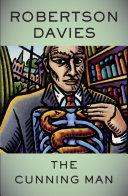Part 4, section 28. The last lines of the novel.
The Cunning Man (1994)
Context: "Can you tell me the time of the last complete show?"
"You have the wrong number."
"Eh? Isn't this the Odeon?"
I decide to give a Burtonian answer.
"No, this is the Great Theatre of Life. Admission is free but the taxation is mortal. You come when you can, and leave when you must. The show is continuous. Good-night."
Quotes from book
The Cunning Man

The Cunning Man, published by McClelland and Stewart in 1994, is the last novel written by Canadian novelist Robertson Davies.
Part 1, section 13.
The Cunning Man (1994)
Part 4, section 21.
The Cunning Man (1994)
Part 4, section 20.
The Cunning Man (1994)
Part 4, section 1.
The Cunning Man (1994)
“Whoever declares a child to be "delicate" thereby crowns and anoints a tyrant.”
Part 1, section 6.
The Cunning Man (1994)
Part 2, section 6.
The Cunning Man (1994)
Context: The ironist is not bitter, he does not seek to undercut everything that seems worthy or serious, he scorns the cheap scoring-off of the wisecracker. He stands, so to speak, somewhat at one side, observes and speaks with a moderation which is occasionally embellished with a flash of controlled exaggeration. He speaks from a certain depth, and thus he is not of the same nature as the wit, who so often speaks from the tongue and no deeper. The wit's desire is to be funny; the ironist is only funny as a secondary achievement.
“The wit's desire is to be funny; the ironist is only funny as a secondary achievement.”
Part 2, section 6.
The Cunning Man (1994)
Context: The ironist is not bitter, he does not seek to undercut everything that seems worthy or serious, he scorns the cheap scoring-off of the wisecracker. He stands, so to speak, somewhat at one side, observes and speaks with a moderation which is occasionally embellished with a flash of controlled exaggeration. He speaks from a certain depth, and thus he is not of the same nature as the wit, who so often speaks from the tongue and no deeper. The wit's desire is to be funny; the ironist is only funny as a secondary achievement.